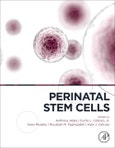Perinatal Stem Cells provides researchers and clinicians with a comprehensive description of the current clinical and pre-clinical applications of stem cells derived from perinatal sources, such as amniotic fluid, placenta and placental membranes, the umbilical cord and Wharton's jelly. It's compiled by leading experts in the field, offering readers detailed insights into sources of perinatal stem cells and their potential for disease treatment. Therapeutic applications of perinatal stem cells include the treatment of in utero and pregnancy related diseases, cardiac disease, liver disease, pulmonary disease, inflammatory diseases, for hematopoietic regeneration, and for neural protection after stroke or traumatic brain injury.
In addition, the rapid advance in clinical translation and commercialization of perinatal stem cell therapies is highlighted in a section on Clinical and Industry Perspective which provides insight into the new opportunities and challenges involved in this novel and exciting industry.
Please Note: This is an On Demand product, delivery may take up to 11 working days after payment has been received.
Table of Contents
Section I. Amniotic Fluid-Derived Stem Cells1. In utero therapy for congenital disorders using amniotic fluid stem cells
2. The Amniotic Fluid Stem Cell Secretome: at the Heart of Regeneration
3. Transplantation of Amniotic Fluid-Derived Neural Stem Cells
4. Stroke therapy: the potential of amniotic fluid-derived stem cells
5. Vascular formation by human perinatal stem cells
6. Amniotic Fluid Stem Cells for Kidney Regeneration
Section II. Placental and Placental Membrane-Derived Stem Cells
7. Placental mesenchymal stem cells for cellular cardiomyoplasty
8. Heterogeneous functions of perinatal mesenchymal stromal cells require a preselection before their banking for clinical use
9. Defining the fetal stem cell niche in the human placenta
10. Banking placental tissue hematopoietic stem cells and mesenchymal stem cells for clinical use
11. Immuno-modulatory mechanisms of placental stem cells
12. Amnion Membrane Allograft for Regenerative Medicine
13. Perinatal cells and biomaterials for wound healing
14. Placental Stem Cells
15. Therapeutic Effect of Extracellular Vesicles Derived from Adult/Perinatal Human Mesenchymal Stem Cells
Section III. Umbilical Cord-Derived Cells
16. Ex-vivo Expansion of Cord Blood Stem Cells
17. Cord Blood Transplantation: Therapeutic Use of Perinatal Stem Cells
18. Autologous Human Cord Blood as a Treatment for Traumatic Brain Injury in Children
19. Phenotypic and Functional Characterization Perinatal Stem Cells Isolated from Umbilical Cord Tissue
20. Mesenchymal stromal cells from Wharton's jelly (WJ-MSCs): coupling their hidden differentiative program with their frank immunomodulatory phenotype
21. Regeneration of ischemic cardiovascular damage using Jelly Wharton as an unlimited source of therapeutic stem cells
22. Phenotype with Focused Paracrine Fractions: Effecting Future Phenotype with Focused Paracrine Fractions
Section IV. Clinical and Industry Perspective
23. Clinical Translation of Perinatal Stem Cell Therapy
24. Current Clinical Trials utilizing Perinatal Stem Cells
A Review
25. Review Of Processing Technology and Techniques for Perinatal Stem Cells Banking And Clinical Applications
26. Clinical Development And Commercialization Of Placenta-Derived Cell Therapy
27. How the patent landscape has changed
28. The Need for Better Assays to Predict the Effectiveness of Tissue Stem Cell Treatments








